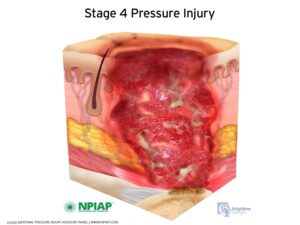
Avoiding Pressure Ulcer Injuries
Pressure Ulcer Injuries. Nursing homes are established to provide the elderly with the assistance and care they need. In many instances, your loved one may become sick or bed ridden due to an accident or disease. If your loved one is currently on bed rest or disabled, it is critical that they are receiving the adequate nursing care, including sufficient food and hydration as well as personal attention from the nursing home staff, to ensure they have adequate movement to shift the weight bearing locations on their bodies. A lack of mobility leading to prolonged periods of time of increased pressure on a resident’s heels, lower back and shoulders can lead to ulcerations, often called decubitus ulcer, pressure ulcer or bedsores. Pressure ulcer injuries are often a sign that the nursing home staff is not assisting the residents to move freely or not turning them as they are meant to. This is a serious form of nursing home abuse that should be dealt with right away. Contacting a nursing home abuse lawyer is your first step against this type of mistreatment.Federal Regulations Preventable and Avoidable Ulcers
The federal regulations require that residents have freedom from abuse, neglect and exploitation. This regulation governs nursing homes considers pressure ulcers to be “AVOIDABLE” and therefore preventable: pressure ulcers / sores. Based on the comprehensive assessment of a resident, the facility must ensure that (1) A resident who enters the facility without pressure sores does not develop pressure sores unless the individual’s clinical condition demonstrates that they were unavoidable; and (2) A resident having pressure sores receives necessary treatment and services to promote healing, prevent infection and prevent new sores from developing.Wound Stages Determine Severity
Bed sores also referred to as decubitus ulcers and pressure sores, are areas of damaged skin and tissue that develop due to a reduction in circulation often accompanied by excessive periods of unrelieved pressure on the affected area. In order to properly track the care provide for a pressure sore, it is essential that the staff understand the correct way to identify and chart the stages of pressure wounds and images of the wounds.Contact an Experienced Attorney
If you notice your loved one has bed sores, then it should act as a warning sign that the nursing staff may not be provided adequate health and personal care. You should contact a nursing home neglect attorney immediately to discuss your legal options. Attorney Kenneth L. LaBore has years of experience handling nursing home abuse and neglect cases and can assist you in determining if there is a claim related to preventable neglect. For a free consultation call 612-743-9048 or toll free at 1-888-452-6589 or fill out the form on this page to discuss your nursing home rights and your legal options. Email: KLaBore@MNnursinghomeneglect.com.
Pressure Ulcer